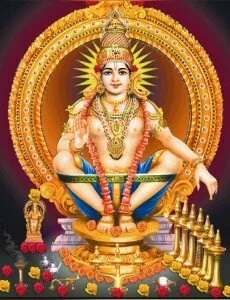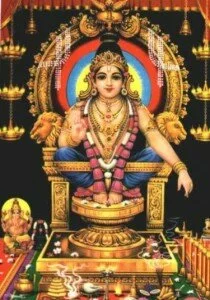Ayyappa Wallpapers | Ayyappa Photos | Ayyappan | Lord Ayyappa | Swamy Ayyappan | Sabarimala Ayyappan Pictures | Swamy Ayyappa Images | Ayyappa Swami
Ayyappa Wallpapers | Ayyappa Photos | Ayyappan | Lord Ayyappa | Swamy Ayyappan | Sabarimala Ayyappan Pictures | Swamy Ayyappa Images | Ayyappa Swami
Ayyappan is a Hindu deity. Lord Ayyappan is worshiped in a number of shrines across India; at Kulathupuzha and Kerala he is worshiped as a child; at Achenkovil in conjunction with his consorts, Pushkala and Poorna; and at Sabarimala as an ascetic – a celibate meditating in solitude for the benefit of all mankind. The name “Ayyappan” is used as a respectful form of address in Malayalam, and the famous mantra Swamiye Sharanam Ayyappa can be directly translated as Give me shelter, Lord Ayyappa! He is considered to be born out of the union between Mohini, (Vishnu), and Shiva.
The most famous Ayyappa shrine in India is the one at Sabarimala with over 50 million devotees visiting it every year, making it the second largest pilgrimage in the world.
Ayyappa is known as “Hariharan Puthiran” because he is the son of both Hari(Vishnu) and Haran(Siva). His most common name is Manikandan because soon after his birth his parents (Mohini & Shiva) tied a necklace with a bell (mani) around his neck (kandan).
Lord Ayyappan had his human sojourn as the son of the Raja (King) of Pandalam, Kerala. At that time, Raja Rajasekhara ruled the kingdom of Pandalam. During one of his hunting expeditions, the Raja was puzzled to hear the wails of a child on the banks of the River Pampa. He moved in the direction of the voice to find a resplendent infant there. The beautiful baby with radiant face wore a gemstone (precious stone) around his neck, hence the name Manikantan (“Mani”, means Diamond and “kantan” means neck).
Manikantan was born of Hari (Lord Vishnu) and Hara (Lord Shiva), with Hari assuming the form of a female (Mohini). Hence Ayyappan is also named as Hariharasutan (Sutan meaning Son).The king, though pious, charitable, just, and God-fearing, had no children. The king was an ardent devotee of Lord Shiva and his queen was devotee of Lord Vishnu. They had prayed to their respective deities for blessings in the form of a child. He accepted the child as God’s gracious response to his fervent prayer for an heir to his throne.
Manikantan was given proper education and training and he grew into a boy well versed in academic lore and martial arts of the time like Kalaripayattu. The Cheerappanchira kalari at Muhamma, in Alappuzha District was responsible for his training in the martial arts. Meanwhile the Rani (Queen) gave birth to a son, however the king regarded Manikantan as his elder son and decided to crown him as the Yuvaraja (heir).
Since the minister of the Raja was always against Manikantan becoming the Yuvaraja, he along with his sycophants turned the queen against the king’s decision. On the coronation day of Manikantan as Yuvaraja, the queen pretended to be suffering from unbearable head ache, and said she was unable to get any relief from the treatment of any doctor (Vaidya). Finally a fake practitioner appeared at the instance of the minister, and prescribed “the milk of a tigress” as the cure of her headache.


Pingback: Watch Hockey Online
Pingback: Streamtorrent Download
Pingback: P2P4U Soccer
Pingback: nordstrom dresses formal
Pingback: African mango plus
Pingback: iyyappan pictures
Pingback: Poverty » Blog Archive » ayappa pictures
Pingback: Ceremony» Blog Archive » iyyapan pictures
Pingback: nordstrom dresses
Pingback: nordstrom dresses
Pingback: nordstrom dresses
Pingback: How To Get Abs
Pingback: registry cleaners
Pingback: Pattaya
Pingback: Butler Auto Auction
Pingback: Belly Fat
Pingback: Cheap Car Insurance For Women
Pingback: Buy Cars
Pingback: Kurs Angielskiego
Pingback: car auctions
Pingback: Cheap Used Cars
Pingback: Good Blog
Pingback: http://foodietots.com/2011/05/18/worm-wednesday-egglings-from-mossy/
Pingback: facebook123
Pingback: Tugjobs
Pingback: Repossessed Cars
Pingback: Very Good Page
Pingback: woodworking books
Pingback: Repo Depot Toronto
Pingback: CNA Training Online
Pingback: Pozycjonowanie Stron
Pingback: cool caravans
Pingback: Buy Facebook Fans
Pingback: screen doors nz
Pingback: Facebook Fans
Pingback: nz kitchen
Pingback: doors auckland
Pingback: Sarisin Porno
Pingback: rest homes
Pingback: Buy Facebook Fan
Pingback: new zealand advertising
Pingback: facebook of sex.
Pingback: Fans Buy
Pingback: generators direct
Pingback: business phone pbx
Pingback: libra horoscope for today
Pingback: Nature Inspired
Pingback: jlkutughk
Pingback: web designer salary
Pingback: Exterior Solar Lights
Pingback: show display
Pingback: increase facebook fans software